Did COVID19 come one year too late?
Where I worry about POST pandemic stupidity, and a lost, great opportunity.
Maybe COVID19 came one year too late, and not because by now it may be already over. To see what I mean, emjoy and share this new mix of COVID19 facts and thoughts from a five weeks nationwide lockdown. All real, all relevant, now or in a few weeks or months, for every country.
The worst
Retirement homes are theathers of war. Two sealed in Lazio, one in Villafrati (Palermo) had 69 positives, the Trivulzio hostel in Milan 70 deaths under investigation, 52 in another home outside Milan, and estimates of a 10% death rate across all Lombardy retirement homes.
Actual letality of COVID19 remains a mistery. A researcher argued that “to know the actual numbers of COVID19 deaths across the country, you should double the official figure in Northern Italy, and multiply by twenty the ones in Southern Italy”.
On April 9, lockdown was extended until (at least) May 3rd. Depending on circumstances, quarantine violations now mean fines up to 3K Euros, or prison up to 5 years. National Unemployment Insurance (“Cassa Integrazione”) will likely not pay before end of May. When they retire, Italian workers get a relatively big lump sum from their employers, called “liquidazione”. A furloughed relative filed to have a 1100 Euros advance, to make it to May, but gave up when she found that she should pay 1500 Euros in state taxes on that money. The Minister for Southern Italy (yes, we have one…) warned of risks for survival of democracy. In such a landscape, is it really news that Mafia distributes food?
Daily life between smiles, confusion, patience and gloomy forecasts
A strange Easter came and went. My family celebrated it on Easter Monday, because that is when my daughter came out of HER quarantine. Helicopters checked that people were not gathering in the beaches near Rome. Everybody shared local versions of memes like this:

and at least one Mass in Rome was celebrated on a rooftop:
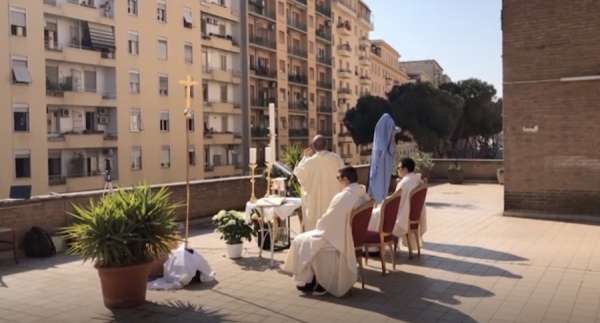
Political calls from balconies backfire. Matteo Salvini, leader of the Lega nationalist party, decided to stream to the nation from his home balcony, and got a “Matteo, enough of this bullshit” soundtrack from the upper floor.
Naples shows the best and worst of Italy. Some downtown streets are still full as before, and fights ensued when people without masks lined up at a supermarket. Still in Naples, an angel breadmaker offers free pasta dishes to whoever cannot afford them, no questions asked.
Local administrators and police channel Chuck Norris. “You are not entering Sicily through the Strait without my permission”, said the Major of Messina. The governor of Puglia sequestered tampon-making equipment going to Veneto “because we need it here”. The city police of Castel Gandolfo, near Rome, published online the fines it issued for social distancing violations:
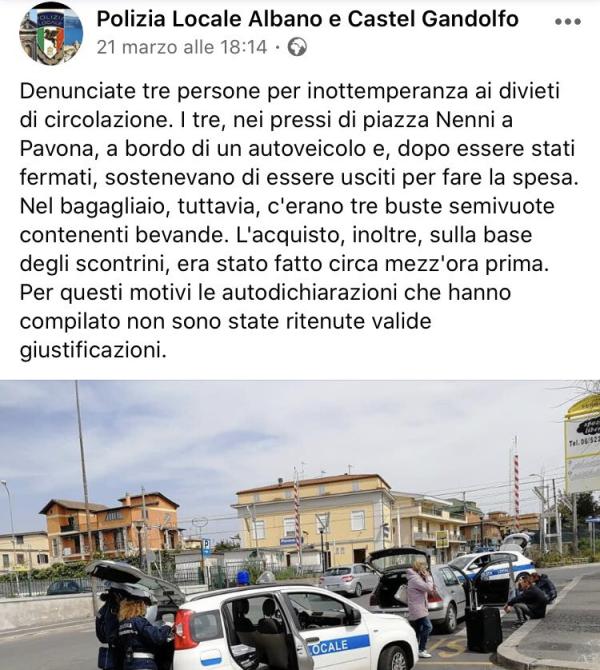
Banks want BYOP. A financial advisor in a bank tells me that, besides paying with her own money the glasses, gloves and maks that she has to use at work, she only receives by appointment, and only clients who BYOP: Bring Your Own Pen, please.
Professional athletes wonder if they will remain professional. Olympic champions like Alessandro Zanardi (paracyclist) or Federica Pellegrini (swimmer) have no idea if indoor-only workouts will be enough to bring them to Tokyo next year.
Service workers need support, not glamour. Their outstanding job should be acknowledged with masks,tests and better pay. Glamourization like this, by cartoonist Milo Manara, seems just tacky to me:

<u><em><strong>CAPTION:</strong>
<a href="/img/manara-covid19.png" target="_blank">Click for bigger version</a>
</em></u>
Roma and homeless people, with shelters closing and no safe jobs, still fear that the worst of COVID19 is AHEAD of them, both here and in the rest of Europe.
More entertainment goes virtual, from concert rehearsals to trekking paths and museum tours in Trentino. The only question is how much of it will remain virtual afterwards. But we may save some restaurants buying coupons for “future” dinners afterwards.
Romance (or lack thereof) is complicated. Magazines tell stories of people who exchanged phone numbers to arrange their first real date… the day before lockdown started. Or of guys left by their partners just before the lockdown, now stuck inside their studio with all the memories she could not return to pick up.
Lack of money widens. Aid packages neglect people who got personal loans from private agencies. The food bank of Rome reports many more people coming. In Turin, a lonely senior citizen called our 911 to say “I have no money anymore”, so the police bought and delivered some groceries). Even the City of Vatican, after five weeks of closed Vatican Museums that are its main source of revenue, is cutting costs and letting contractors go.
Crime has somehow found a new normal. Justice, not so much. Phishing takes the form of 200 Euros grocery coupons via WhatsApp. Our version of the no-ship firm that won a ferry contract in UK is the guy just arrested for winning a 15.8 million Euro public tender, to supply millions of masks he has never seen, nor bought.
Pushers offer home delivery of cocaine, masking themselves as fresh pasta sellers. Since masks protect from COVID19 as much as from security cameras, this guy in Foggia could easily place a bomb outside a store and bike away:
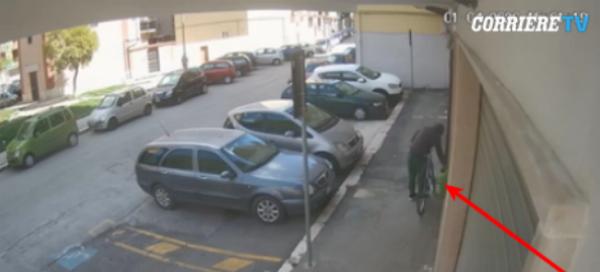
People on trial for major bankruptcies feel good because court hearings are suspended. A fire in the Palace of Justice in Milan destroyed many trial proceedings not digitized anywhere.
Factories pivot, but too few executives do the right thing. After single seamstresses making masks, whole companies switched to produce masks, hand sanitizer or even ventilators. But Italy also needs more companies like Luxottica, that cut manager salaries and keeps its workers safe by paying them the difference between their normal salaries and unemployment insurance.
Modern Italy has never been less polluted, but wildlife suffers. In living memory, Neaple’s gulf never was “so clear, it seems Sardinia”. In Lombardy, a park that hosts endangered species risks closing for lack of visitors.
Inequality wears new faces. Almost 34% of Italian families struggle to handle school lessons online, because they own no computer, or tablet.

Escorts who can afford a private, good looking bedroom are “smart working from home”: street prostitutes, instead, line up at catholic soup kitchens.
Consumption has stopped, and recycling may follow. Due to a 75% decrease of sales (even online), italian book publishers may publish about 23 thousands titles less this year. Sales of TV sets are 8.7% down. I have not experienced them myself so far, but there are reports of 30% price increases on some groceries. Meanwhile, collection of recyclable packaging is at risk.
Death and their aftermaths are different. The father of a friend died (not of COVID19) on Easter Monday: in his home bed, but after weeks of seeing only masked faces, who would stay as far as they possibly could, to protect him. I’ve heard of someone in Piedmont hosting her father’s ashes on a living room shelf, because no more suitable location could be found on the moment. That is still better than Milan, where both cremations and autopsies were temporarily stopped, due to 76% more deaths this March than one year ago.
Parents and pet owners are confused. The former don’t know yet if they can buy stationery in supermarkets, to keep children busy. The latter ask whether they should “sanitize my dog’s legs with bleach”.
Divorced parents who live in different towns do not know (as of early April) how to practice shared custody of their children.
Migrants are a forgotten dylemma. One about food. Illegal migrants already gathered in temporary hosting centers can remain there for now. Politicians denounce NGOs that still bring potentially infected people on italian shores, while closed ports across the Mediterranean make hard to decide who should be responsible for boat people lost at sea.
Regular or not, migrants are also who may save the harvest season, and keep food on store shelves. Farmer associations warned that without 200k workers, as much as 40% of this year’s harvests will be lost. Just like in the US, and other countries. This, and public health, is why the Sant’Egidio NGO proposes to regularize illegal migrants, as Portugal did: regularization would make it easier to limit contagion among, and from the same migrants.
Phase 2 and beyond: what a mess
The burden on hospitals has decreased but a second wave is almost certain, said a WHO expert. The Lazio region just announced that next autumn its residents over 65 years old will need a flu vaccine certificate to enter ballrooms or other senior entertainment centers.
Schools may have no valid grades, and burned out parents. Italian school laws still do not cover procedures (or teacher duties) about teaching or grading online. In some high schools 3 out of 5 teachers do NOT want to do video lessons. Lessons based on broadband and larger-than-smartphones screens may be considered a negation of the equal access to schooling granted by the italian Constitution itself. All this, argues a teacher, means that the whole circus of online lessons and tests may be no more legal than mere “chats in a pub”: stuff that any court would void, if parents sued schools for bad grades.
Right now, nobody can explain how parents who may soon go back to work should cope with schools still closed and grandparents forbidden to babysit, for their own safety. Next fall, rumor has it that schools may implement social distancing with shifts, i.e. splitting each class in two, half in the morning, half in the afternoon. Or half in class, half connected from home.
The second solution needs broadband and devices for everybody. The first makes for more teaching jobs, and surely more productive lessons, but would be a real nightmare for parents. School shifts over 12/14 hours were normal here in the 70s, when the demographic boom had literally filled schools to the roofs. But back then, one salary per family was enough to pay the bills and watch after the kids, and many less jobs than today had shifts.
Transportation may be the biggest elephant in the italian room, I mean streets: if, to prevent contagion or from fear of it, public transit is limited to 60% capacity or otherwise discouraged , the many residents of large cities who cannot telecommute nor make shifts may wish they were unemployed. Even if they still had money for a car and gas, they would have no space to drive and park it.
Tourism? Hmm. I will be happy if this pandemic shuts down for good certain alpine resorts that look like Las Vegas. As I said since the beginning, a stop to overtourism will (eventually…) save Venice and many other places. But too many good things will disappear for years, if they reappear at all. Tourism in Italy, from B&Bs in Rimini to mountain huts, is heavily based on family hospitality and physical closeness that are taboo now. Internal demand will replace only a small part of foreign tourists, and only after many things change (besides having money for holidays again): I know people in Rome who last year went to Sharm El Sheikh instead of Calabria, because “it’s faster to reach, and cheaper”.
Contact tracing? An app for this purpose has just been officially recommended by the italian government. On this topic, I have seen a lot of discussion and commentaries, and the only things that seem sure remain these:
- app-based contact tracing is useless unless it starts when there are very little infected people to monitor, together with adequate testing capability, and matching the actual ways of working of the healthcare system that uses it
- many politicians and geeks, each clueless in their own ways, bitched of privacy vs safety for weeks. Then the part of US Big Tech that wasn’t already making more money than before said “hold my beer while I do this”. “After decades fighting governments that rule by decree, now we must fight rule by app”, I read on Twitter
- both in Italy and EU, several politicians who just two years ago proudly “fought” Google &C with a DUMB copyright directive are now grateful to their digital saviours
- Contact tracing may be an unavoidable part of the solution, but makes acceptable LONG TERM surveillance that would have been unacceptable in 2019
Europe? It’s complicated
Orthodox economic journals point out that the European Stability Mechanism would not guarantee any long term growth in Italy. Ursula van der Leyen acknowledged that “No EU country can get past this crisis alone and told Italians “EU is with you now”, in the same days when a city councillor took down the flag of “this EU of bureaucrats that does not represent us”.
Everything wrong AFTER COVID19, in two examples
Here is a perfect “let’s get our lives back” exploitation story: a proposal to equip italian beaches with plexiglass walls around beach umbrellas:
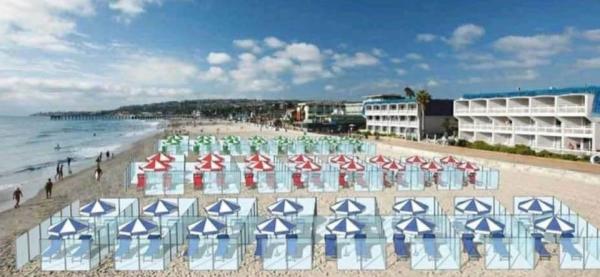
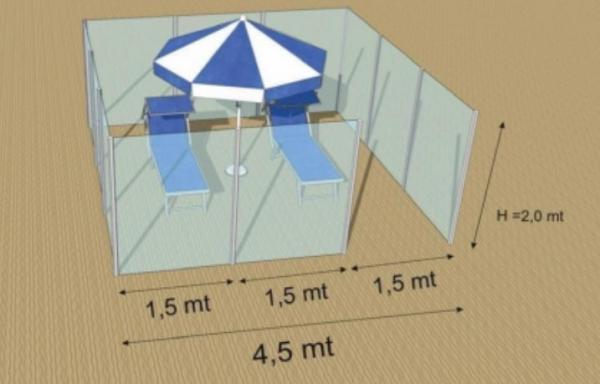
“If you wanted cemetery niches, you could have just asked us”, quipped a funeral parlor.
If they worked, those niches would “just” keep off beaches everybody unable to pay all that restructuring. But they won’t work. In our climate, people would roast inside greenhouses that don’t let the wind in. The first storm will scatter shards of plastic all over the beach. Writers priced out by this over-gentrification will cover the walls with insults. All this, to save businesses that, at least here in Rome, have completely privatized beaches visited by tens of thousands people every summer, paying as little as 2K Euros per month to the state. But hey, “let’s get our life back”.
The other example is parties in the government now announcing some grand program of construction works, obviously with “simplified” environmental, anti-mafia and anti-corruption controls. Give people means of livelihood, OK, no question. But doing it in the same sectors and ways that created huge waste and problems of all sorts until three mere months ago would be criminal, if it weren’t monumentally dumb.
No way back
Were lockdowns as in Italy, or elsewhere, the best possible answer to COVID19? In more than one way, this matters every week less. Today, only two things seem already certain:
- the system of 2019 is a system that increases the risk of pandemics and, by its own design, cannot avoid periodic crashes as in 2008 or worst
- regardless of its merits or faults, by now that system has already been broken so badly, in Italy and abroad, that it cannot be resuscitated with any “standard” measure
Previous “regular” downturns started in sectors with relatively few workers, maybe only in a few countries, spreading from there “as a muffled shock”. A pandemic that directly and immediately chokes almost all services of a whole country is a completely different beast. In Italy, and worldwide if, as FP says: “Germany’s GDP is predicted to fall by more than that of the US, dragged down by its dependence on exports”.
Catholic Social Doctrine may become pretty popular in 2021. “Public enemy number 1 will be neoliberism”, titled the Vatican newspaper a few days ago. In that article, a John Hopkins professor says the same thing as FP: “Unlike the 1929 and 2008 crises, this one hits first and foremost the real economy, not financial markets”. Then, he notes that in Italy alone there are about 360K NGOs that could do a world of good, if supported, but “The problem are the sectors that oppose the subsidiarity principle”. But the part I like the most is such an authoritative voice making the same point I’ve been doing since the first of my COVID19 posts: “This pandemic looks a lot like the “creative distruction”… which is considered a physiological component of capitalism”. A similar analysis is in the Jesuits magazine “Civilta' Cattolica”.
Who should get money and aid, in Italy and beyond
Everything I have seen and shared about Italy in lockdown makes me think that what COVID19 (or reactions to it) has already done is, indeed, something never experienced before. But if that is the case, quarrels over who’s better among the European Stability Mechanism, the SURE plan, Coronabonds or Eurobonds, are like a Guild of PTOLEMAIC Astronomers, arguing over which of them is most qualified to pilot space ships to Mars.
Apart from building on obsolete realities, the main problems of all those programs remain excessive complexity, and room for abuse, or waste. Thousands of different initiatives, each with thousands details, leakage points and unpredictable effects on others? I saw on Facebook a small entrepreneur summarizing EU and state-level measures as “please shut down your business and don’t worry! I will help you to make debt to pay me taxes”.
Clickbait like “Mafia can’t wait to grab EU money” is incomplete. Really inefficient, 100% legal italian companies and public administrations are just as eager to get that money. But even as is, that clickbait has value: it is one more good reason why EU should give real money directly to people, not companies. Make people feel safe, and they will not run to mobsters. Ditto for small businesses, that would still have customers. It would be really interesting to see how EU and Member States would refuse requests like that.
Heck, even a Trump-like figure like Flavio Briatore said that money should go directly to people, not banks.
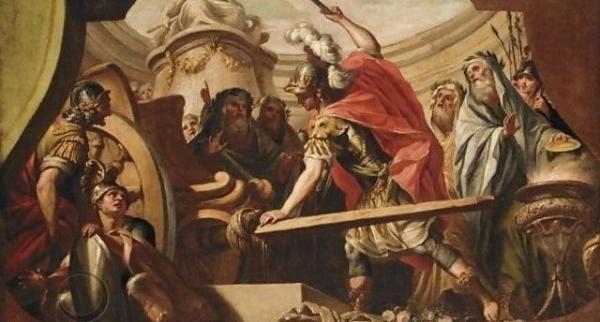
In the actual Italy and Europe of today, quantitative easing for people (if you really can’t stand calling it “Universal Basic Income”) or a “modern debt jubilee”, may have been left just like democracy: “the worst solution, except for all the others”. A reduced version of essentially the same thing may be “strongly encouraged”, state-paid retirement for almost everybody over 60, if not 55.
As far as companies and states are concerned, rather than loans impossible to repay, what about giving money away, but only to companies, or administrations, that, just as example, switch to really transparent accounting practices and commit to use much, MUCH less plastic and fossil fuels than before?
Madness? Besides being simple enough to actually work as intended, measures like these may even cost less, overall. All I’d want is they get the same serious debate as the other pies in the sky of Bruxelles right now, and the same general attention they would have surely received just one year ago.
What if COVID19 was COVID18?
If you think the scenarios and proposals here are unrealistic, imagine for a moment this coronavirus coming in January 2019, not 2020. Imagine COVID18.
Imagine an European Union and UK with 8780K COVID19 cases and counting, one month before Eu elections, not eleven after. With Boris Johnson in ICU, and a UK parliament unable to even define what Brexit should mean.
Imagine the US, and Trump, and Sanders… starting the primaries after months of unprecedented unemployment, and a White House managing the pandemic as it has done so far.
Imagine Putin, modifying the Russian Constitution as he did last November, with a pandemic in his hands. Or Chile, doing the same thing.
Imagine Modi’s chances to get the same huge majority he got in May 2019, in an India stalked by coronavirus.
Imagine the ANC that was in trouble because of “struggling economy and corruption” losing, not winning, the South Africa election of May 2019, because of COVID19.
Maybe COVID in 2020 was a blessing, because with too many elections going mad at the same time we could all very well be in WWIII by now. Or learning mandarin, more likely. But if it had to happen, maybe the worst thing of COVID19 is that it wasn’t COVID18.
Usual, unavoidable final consideration
Some moron became so popular for organizing illegal group barbecues on a rooftop in Palermo that he now demands 1500 Euros to be interviewed. Excuse me for being angry. Such news force me to humbly repeat my suggestion that whoever has spare money these days may do much better (after funding hospitals!) by supporting me, instead, or anybody else working hard to share useful information for now, and the future.
Who writes this, why, and how to help
I am Marco Fioretti, tech writer and aspiring polymath doing human-digital research and popularization.
I do it because YOUR civil rights and the quality of YOUR life depend every year more on how software is used AROUND you.
To this end, I have already shared more than a million words on this blog, without any paywall or user tracking, and am sharing the next million through a newsletter, also without any paywall.
The more direct support I get, the more I can continue to inform for free parents, teachers, decision makers, and everybody else who should know more stuff like this. You can support me with paid subscriptions to my newsletter, donations via PayPal (mfioretti@nexaima.net) or LiberaPay, or in any of the other ways listed here.THANKS for your support!